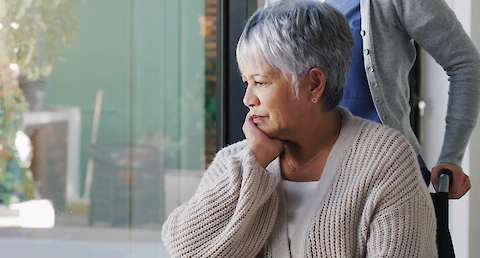
Feeling sadder than usual or even depressed during a particular time of year can make it difficult to be productive and manage everyday tasks during those months, especially for seniors that typically spend the majority of their time at home and around few people. Below is an overview of the symptoms and effects of seasonal affective disorder. Find out how Senior Helpers Charlotte can help if this condition is affecting an older adult in your life!
What is Seasonal Affective Disorder?
Seasonal affective disorder, or SAD, is a type of depression that individuals experience during a specific time of year. It tends to be the most common among individuals who also have another type of depression or mental health disorder.
SAD tends to be the most common during the winter months. However, it is also possible to experience symptoms during the summer. Summer-pattern SAD is less common than winter-pattern SAD. This can make it more challenging to understand and diagnose, but it results in similar symptoms. Individuals with this type of SAD typically feel worse than usual during the late spring and summer and feel better as fall approaches. Although this pattern is less common during this time of year, cycles typically last around the same amount of time as they do in the winter.
How Can SAD Affect Seniors?
Many seniors do not get enough vitamin D, which can play a major role in causing SAD. Seniors also tend to have a more difficult time spending time outdoors and enjoying the sunlight. This can also contribute to more significant symptoms. Older women also tend to be more likely to experience SAD than men. This is also particularly true for women who live further from the equator and have access to less natural light.
Common Symptoms of Seasonal Affective Disorder
Knowing what to look for can help caregivers determine whether seniors may be experiencing seasonal affective disorder. This can be an important step in helping them find ways to feel better during the most difficult months. This is particularly true when assisting seniors who may be experiencing summer-pattern SAD, which can be more difficult to detect than winter-pattern SAD.
Like individuals with other types of depression, seniors experiencing any type of SAD may experience:
- A temporary loss of interest in activities they enjoy during the rest of the year
- Low energy levels, sluggishness, and problems sleeping
- Difficulty concentrating
- Feeling worthless, hopeless, or otherwise depressed
- Appetite or weight changes
- Suicidal thoughts
Individuals with summer-pattern SAD may experience additional or more specific symptoms, such as:
- Insomnia
- Frequent restlessness, agitation, and anxiety
- A poor appetite that results in significant weight loss
- Violent behavior
These symptoms can typically only be present for approximately 4-5 months out of each year to be considered to be SAD instead of another type of depression. In order to make the most accurate diagnosis possible, symptoms will generally also need to have been present for a minimum of two consecutive years.
At Senior Helpers of Charlotte, our home care services team can help seniors in the Charlotte, Pineville, and Concord areas identify possible symptoms of seasonal affective disorder while assisting them with a wide range of tasks that can help them continue living in their own homes for as long as possible.
Contact us today to learn more about how we can help your older loved ones manage both the physical and mental effects of aging through in-home care or to get started!